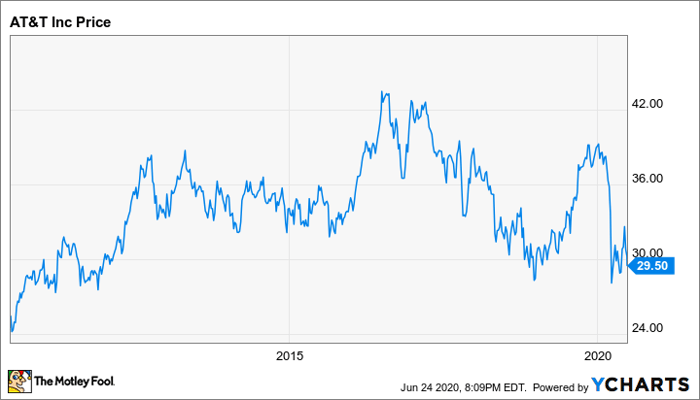Historically, the tech industry was not known for paying dividends to investors. Although Microsoft and Cisco have become dividend stalwarts today, back in the 1990s and early 2000s, they famously eschewed dividends, preferring to reinvest their profits into growing their businesses.
However, as the tech industry has matured, many companies have reached the point where it makes sense to follow the lead of older, stable companies, and start sharing profits with shareholders.
Today, AT&T (NYSE: T), International Business Machines (NYSE: IBM), and Seagate Technology (NASDAQ: STX) not only offer dividends that yield more than 5%, they also offer investors considerable potential for stock price growth.

Image source: Getty Images
AT&T
AT&T has struggled for years amid intense competition, cord-cutting, and a costly 5G build-out. Earlier this year, the stock price took a further hit after the company announced that it would suspend its share-buyback program in the midst of the COVID-19 pandemic.
In December, AT&T increased its payout for the 36th consecutive year. That steady dividend growth, combined with an extended period of stagnation in the stock price, has resulted in a high yield. This year's annualized dividends of $2.08 per share produce a yield of around 7.1% at the current share price.
AT&T Stock Performance, data by YCharts.
Also, AT&T's dividend payout ratio -- the percentage of its net income that goes to cover the dividend -- stands at about 65%. Although that's high, it should be sustainable, and it leaves room for further increases.
Moreover, the company's stock could have meaningful upside in the years ahead. As one of only three companies that will be offering nationwide 5G service in the U.S., AT&T should hold some pricing power. Additionally, the stock's forward P/E ratio of 9.1 looks attractive.
However, the stock is also cheap for a reason. Analysts forecast that AT&T will deliver average annual earnings growth of less than 1.8% for the next five years. Also, buying DirecTV and WarnerMedia required it to take on tremendous debt. What will happen with these non-5G enterprises remains unclear.
Still, while the stock has mixed prospects, the problems will probably not compromise the dividend. Since AT&T will want to avoid the further pressure on its shares that would come if it lost its Dividend Aristocrat status, shareholders can probably count on another payout hike this December.
IBM
IBM is not only the newest Dividend Aristocrat, it also offers one of the highest yields among them. With its latest payout hike -- to $6.52 per share on an annual basis -- IBM increased its streak of dividend increases to 25 straight years. Its dividend yield now stands at nearly 5.6%.
Like AT&T, IBM's stock price moves haven't rewarded long-term shareholders. While it was considerably higher at various points this past decade, IBM stock is now back to where it traded in July 2009.
Between that reversion and the increasing dividend, IBM's yield has expanded. Additionally, now that the company has earned entry into the exclusive ranks of the Dividend Aristocrats, management will likely want to do what it takes to stay there. With a payout ratio of around 58%, IBM should be able to continue its string of dividend hikes.
IBM Stock Performance, data by YCharts.
This is also a time of transition for the company. Arvind Krishna, who took the CEO job in April, previously headed IBM's cloud division and played a role in last year's $34 billion takeover of Red Hat. Also, in the most recent quarter, IBM's total cloud revenue rose by 19% year over year, even as company revenue fell by 3.4%.
For now, IBM stock trades for about 10.5 times projected 2020 earnings, and analysts expect annual earnings growth to average about 3.9% over the next five years. However, these numbers may improve as Krishna pares down the company's slow-growth divisions, which could make IBM both a growth and dividend stalwart.
Seagate
Like IBM, Seagate has had to redefine itself. While it specialized in hard drives during the PC era, it has placed more emphasis on supplying memory for edge computing as technology has evolved.
While few think of it as a dividend stock, Seagate has increased its payout periodically since beginning regular dividends in 2003. For a two-year period between 2009 and 2011, the company suspended its dividend while it recovered from the financial crisis. But today, its annual payout of $2.60 per share yields 5.5%. And with a payout ratio of approximately 52%, it can easily afford to sustain this dividend.
From a valuation standpoint, Seagate has failed to gain consistent traction over the last few years. The stock currently trades for a little more than nine times forward earnings. Given that it has averaged a forward P/E ratio of 10.2 over the last five years, investors may not see significant multiple expansion from here. Moreover, the stock today is trading well below the record high it hit in late 2014.
Seagate Technology, data by YCharts.
Though earnings increases have been modest, analysts forecast that annual earnings growth will average 9.1% over the next five years. Hence, investors could end up buying significant growth relative to Seagate's current valuation. Moreover, even if the stock price remains stagnant, shareholders will benefit from the generous dividend.
10 stocks we like better than IBM
When investing geniuses David and Tom Gardner have a stock tip, it can pay to listen. After all, the newsletter they have run for over a decade, Motley Fool Stock Advisor, has tripled the market.*
David and Tom just revealed what they believe are the ten best stocks for investors to buy right now... and IBM wasn't one of them! That's right -- they think these 10 stocks are even better buys.
*Stock Advisor returns as of June 2, 2020
Teresa Kersten, an employee of LinkedIn, a Microsoft subsidiary, is a member of The Motley Fool's board of directors. Will Healy owns shares of AT&T. The Motley Fool owns shares of and recommends Microsoft and recommends the following options: long January 2021 $85 calls on Microsoft and short January 2021 $115 calls on Microsoft. The Motley Fool has a disclosure policy.
The views and opinions expressed herein are the views and opinions of the author and do not necessarily reflect those of Nasdaq, Inc.





